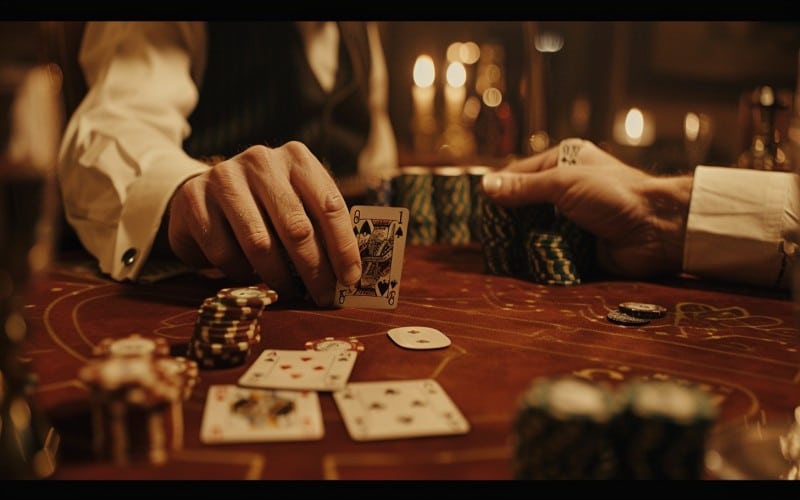Champions of games involving sheer randomness shouldn’t be superstitious. And yet even legendary gamblers who’ve achieved mastery of gambling or pure chance can’t resist carrying a lucky charm or engaging in eccentric rituals before hitting the tables. It’s an impulse that, like faith, transcends all logic and spans cultures worldwide. The circumstances may differ, but compulsions to appease the cosmos are universal across gambling’s elite.
Rituals of Legendary Gamblers
No other gambling discipline attracts bigger stars and more fanatical adherents of superstition than poker. Professionals dutifully retreat into their bizarre worlds before major tournaments, adhering to sacred routines. This practice also extends to the growing world of online gambling, where players develop their peculiar superstitious practices. Some common superstitions among online gamblers include:
- Only playing on certain devices or browsers, believing their laptop/phone/tablet brings them luck.
- Always logging in and out of sites a specific number of times before placing bets.
- Refusing to change their username or avatar out of fear.
Interestingly, these online gamblers sometimes hit big while playing, even if it’s their first time at a casino. There are stories of people who, just by using the famous casino no-deposit bonuses like those from famous casinos listed at https://polskiesloty.com/bonus-bez-depozytu/, have gone on to win big. However, the truth of the matter is that the world of land-based casinos is where all the crazy superstitions happen.
Take Sammy Farha, a 3-time World Series of Poker bracelet winner considered one of the best to ever play the game. Sam was notorious for obscure game rituals like always having an unlit cigarette in his mouth as part of his rituals.
Other top poker pros are no less eccentric when it comes to spiritual beliefs. Johnny Chan, the 1988 World Series of Poker main event winner, is well known for carrying a “lucky” orange fruit with him at all times – a tradition he says always made him feel lucky. Meanwhile, the legendary Doyle Brunson has one of the most bizarre poker lucky charms imaginable – a printed card protector( a friendly ghost) that he insisted had supernatural powers.
Now let us explore why superstitions hold such appeal for professional gamblers, even those who excel at games of pure chance.
Seeking Control in a Game of Chance
At their core, gambling superstitions represent an attempt to exert control over outcomes that are inherently random and uncontrollable. For professional gamblers who stake their livelihoods on probability and odds, the need to feel like they can somehow sway things in their favor through rituals and lucky charms is deeply alluring. It’s a psychological coping mechanism that provides an illusion of influence over the uncontrollable.
Think about it – a seasoned gambler understands the mathematical realities at play. Yet, they still cling to superstitious beliefs as if they’re investing in random objects and behaviors with metaphysical potency. Why? Because surrendering fully to the whims of chance can feel disempowering, even for the most rational minds. Rituals create a sense of being an active agent in the proceedings rather than a passive bystander.
A Shield Against Harsh Realities
Closely related is how superstitious thinking can act as a psychological shield against the harsh realities and stinging losses that are inevitable in gambling, no matter one’s level of skill. Every professional has endured horrendous downswings and brinks of ruin that can shake even the most steadfast. Clinging to pregame rituals or lucky objects creates a sense of empowerment that losing streaks won’t last forever.
This dynamic can breed an almost cult-like devotion to objects, chants, and obscure practices amidst gambling’s upper echelons. If a lucky habit or routine is seen as integral to triumphing over a rough patch, abandoning it starts to feel like surrendering future winnings to the void. Little wonder betting pros become so devout in their superstitious allegiances – anything that safeguards against harsh reality carries power.
Bonding and Tradition
Superstitious rituals and beliefs don’t just provide psychological comfort to individual gamblers – they also foster a sense of community and shared tradition amongst gambling cohorts. Pre-game ceremonies, protective charms, and other customs get passed along from one generation of gamblers to the next, creating a bond that transcends individual practice.
Think of how many iconic craps crews or poker stables have unique lucky routines that become ingrained as part of their ethos and lore. To outsiders, it may seem ludicrous that elite pros could buy into such superstitious thinking. But within the tight-knit circles of gambling culture, these habits carry great significance as bonding traditions to be handed down reverentially.
The Showmanship Factor
Finally, one can’t ignore the role that sheer showmanship and mystique play in gambling’s high-profile superstitions. Let’s face it – eccentric pregame rituals and offbeat lucky objects add an aura of charisma and theater to gambling events. They feed into the larger-than-life narratives surrounding high rollers and betting legends.
Picture how much more intrigue and color is added when a whale like Kerry Packer demands nobody taller than him can stand nearby before he plops down millions. Or a crap wizard-like Golden Arms slips into an arcane trance state before gripping the dice. For many elite gamblers, leaning into superstitious personas is simply good showmanship that heightens their mythic appeal.
In the End
Gambling’s greatest players seem to share a universal need to inject ritual and lucky thinking into a random game of pure chance. Perhaps it’s a psychological coping mechanism required to handle the intense swings and volatility. Whatever the reason, these kinds of superstitious behaviors have become ingrained into the lore of gambling culture over centuries.

